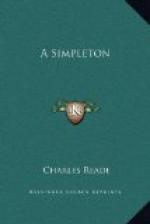The Hottentot with the reins was now bent like a bow all the time, keeping the cattle from flowing diverse over precipices, and the Kafir with his kambok was here, and there, and everywhere, his whip flicking like a lancet, and cracking like a horse-pistol, and the pair vied like Apollo and Pan, not which could sing sweetest, but swear loudest. Having the lofty hill for some hours between them and the sun, they bumped, and jolted, and stuck in mud-holes, and flogged and swore the cattle out of them again, till at last they got to the bottom, where ran a turbid kloof or stream. It was fordable, but the recent rains had licked away the slope; so the existing bank was two feet above the stream. Little recked the demon drivers or the parched cattle; in they plunged promiscuously, with a flop like thunder, followed by an awful splashing. The wagon stuck fast in the mud, the horses tied themselves in a knot, and rolled about in the stream, and the oxen drank imperturbably.
“Oh, the salt! the salt!” screamed Phoebe, and the rocks re-echoed her lamentations.
The wagon was inextricable, the cattle done up, the savages lazy, so they stayed for several hours. Christopher botanized, but not alone. Phoebe drew Ucatella apart, and explained to her that when a man is a little wrong in the head, it makes a child of him: “So,” said she, “you must think he is your child, and never let him out of your sight.”
“All right,” said the sable Juno, who spoke English ridiculously well, and rapped out idioms; especially “Come on,” and “All right.”
About dusk, what the drivers had foreseen, though they had not the sense to explain it, took place; the kloof dwindled to a mere gutter, and the wagon stuck high and dry. Phoebe waved her handkerchief to Ucatella. Ucatella, who had dogged Christopher about four hours without a word, now took his hand, and said, “My child, missy wants us; come on;” and so led him unresistingly.
The drivers, flogging like devils, cursing like troopers, and yelling like hyenas gone mad, tried to get the wagon off; but it was fast as a rock. Then Dick and the Hottentot put their shoulders to one wheel, and tried to prise it up, while the Kafir encouraged the cattle with his thong. Observing this, Christopher went in, with his sable custodian at his heels, and heaved at the other embedded wheel. The wagon was lifted directly, so that the cattle tugged it out, and they got clear. On examination, the salt had just escaped.
Says Ucatella to Phoebe, a little ostentatiously, “My child is strong and useful; make little missy a good slave.”
“A slave! Heaven forbid!” said Phoebe. “He’ll be a father to us all, once he gets his head back; and I do think it is coming—but very slow.”
The next three days offered the ordinary incidents of African travel, but nothing that operated much on Christopher’s mind, which is the true point of this narrative; and as there are many admirable books of African travel, it is the more proper I should confine myself to what may be called the relevant incidents of the journey.




